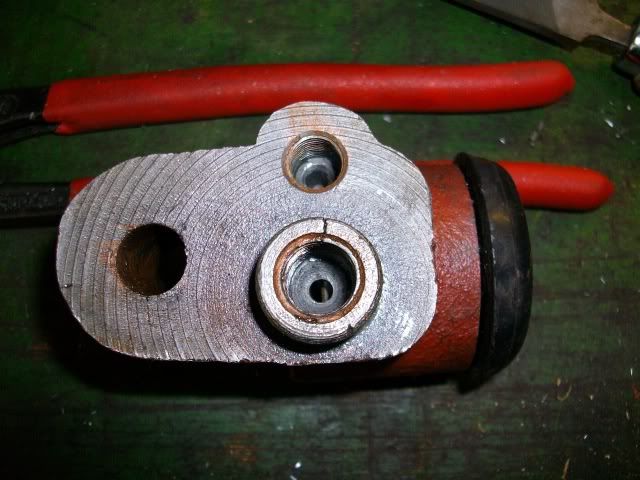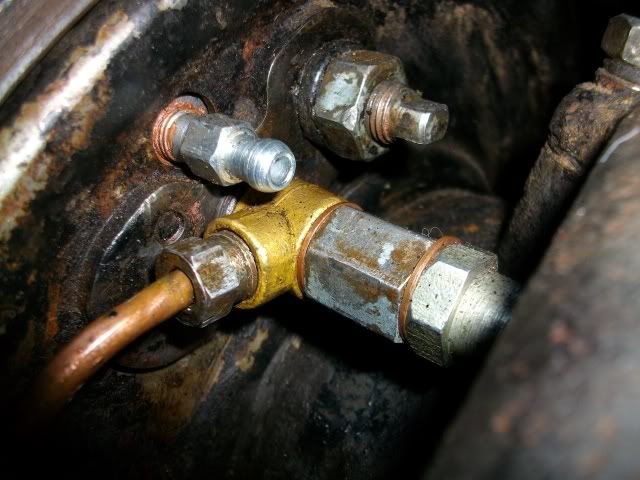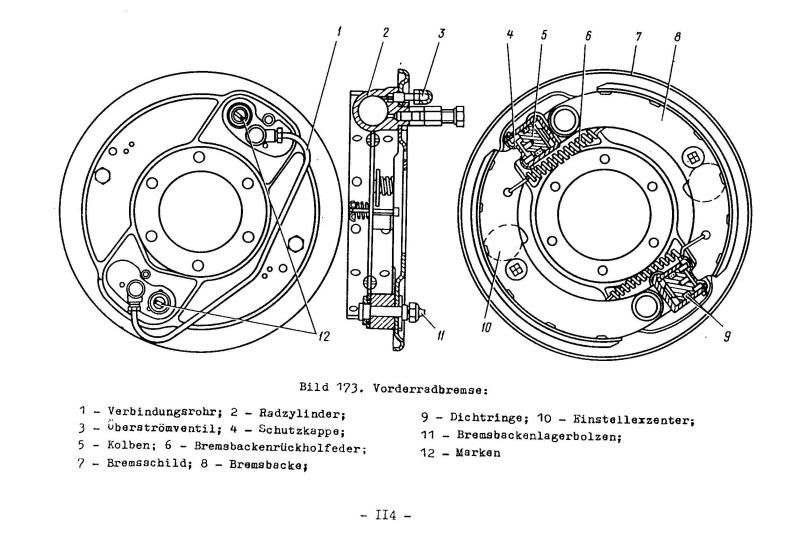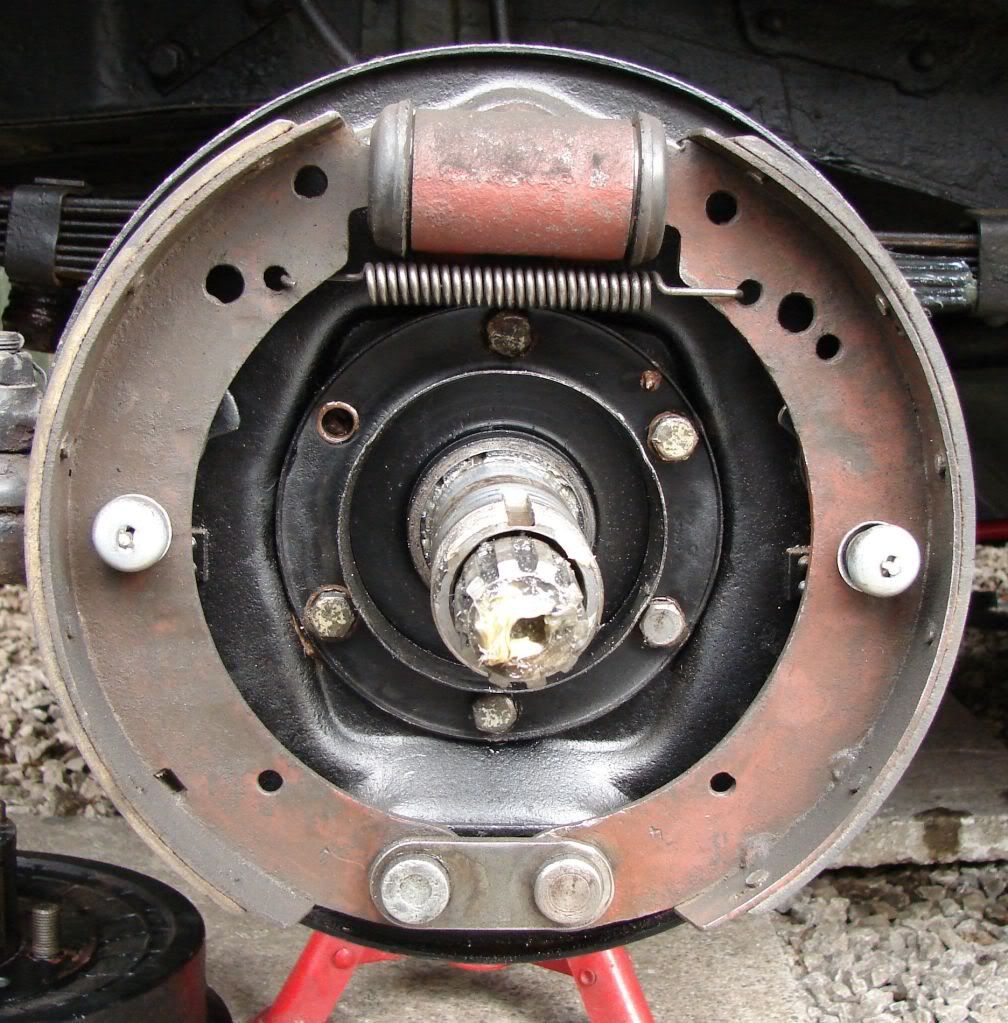Hello Matteo, (I think you have got the duplex and simplex mixed up in the post above) very clever of you to start this thread. I consider myself an expert in the GAZ braking system ;) as I think I encountered every single problem related to this issue when replacing my brake system.
When I got my GAZ 2 years ago it has stood for about 3 years so the brakes were all seized up. Since parts from Todor are cheap I decided to replace the lot (around 300 euros for all brake cylinders, shoes and hoses). Then the nightmare started!

Getting all the old stuff off was not a problem. Because the steel lines looked ok I decided not to replace them.
I changed all the parts, bled the system and pressed the brake pedal firmly for the first time ... a hissing noise came from under the body: the steel line burst open ... so the next step was to replace all the steel brake line with copper line.
I have got the UAZ front axle so the two opposing brake cylinders per wheel. Because this system uses a small line that connects the two cyilinders it has a banj bolt, a few copper rings, adapter pieces and other bits and bobs.
It takes a bit of practice to make a nice trumpet shape end on the lines but I got it in the end. After installing all the new tubing the system was filled up with silicone brake fluid (DOT 5, as was advised on the German GAZ forum) and bled. First the fluid came out of the back (!) of one of the front cylinders. It turned out that the thread in the hole where the banjo bolt comes in wasn't deep enough. Because it kept leaking I tightened it a bit more ... until the cast iron snapped and formed a crack in the brake cylinder.
Tip #1: check and test fit connections

To get all those described connections leak free took a lot of time. Once I thought I had solved a leaking joint another leak occured. Here you can see where the line goes from the top cylinder to the bottom cylinder:

Also the copper washers gave a lot of trouble, they needed overtightening to get them closed. I think a next time I would choose those aluminium washers with a rubber lining (the industrial name is Usit-rings).
That's tip #2.
The pistons on the front brake cylinders are made of aluminium and carry two regular rubber o-rings as a seal. The rubber rings were of very poor quality. Again I found this out after installing the parts on the car and discovering them leaking from inside. Inspecting the rubber o-rings, they had flat spots on them and weren't even deburred; the excess rubber casting material wasn't removed so made it possible to leak fluid along the seals. I got a few replacement o-rings of western quality at the local hydraulics workshop and got that problem sorted. Sorry, no picture of this.
Tip #3: check rubber o-ring seals and replace if necessary. 'new part from Russia' doesn't mean 'better then the old part'
Another part that I messed up was one of the front brake hoses. As they have a fine thread it is absolutely necessary to test fit them by hand and only proceed using tools when you have made sure the connection is screwed in straight for a fair number of turns.
That's #4 for you there.
I already mentioned that forming the lines end requires some practices. This resulted in having to redo some of the lines ends or complete lines in order to get them leak free.
Tip #5: take the old brake lines to a motor shop and have them copied. Or practice first before replacing them yourself.
All these leaks meant that brand new brake shoes were covered in silicone brake fluid. Since I did not want to start with any contaminated brake shoes I had to order some new ones. As a result of all these mess ups and leaks I had to extra order: 5 brake shoes, 2 brake cylinders and one brake hose. I had to open up all 4 front wheel brake cylinders to replace the rubber rings so also covered the inside with ATE brake cylinder paste. Since I always learned that you are never to take a new brake cylinder apart, because then you are likely to damage the seals, I have not taken apart the new rear brake cylinders. I have not had any trouble with them. Also the new master brake cylinder is functioning without any trouble. It has been mainly the front ones, trumpet shaped line ends, copper washers and connections in general that gave the trouble.
After all the trouble the front brakes looked like this:

In general: replacing the brake lines can be done on the car as it is. But it is a hell of a lot easier when the steel metal panels are removed for better access. It's extra work but it pays, especially when brake hoses and lines on the front of the car have to be replaced.
Bleeding silicone brake fluid filled systems seem to take more time then bleeding regular brake fluid filled systems. After bleeding it for the first time, I found out that a second time was necessary after the vehicle had stood for 24 hours. Brakes are now rock solid.
Also take your time to adjust the brake shoes according to the manual. It pays off.
Since the brake system is overhauled I have driven approx. 3000 km with the GAZ without any brake issues. It brakes very well for a drum brake type car. However considering the nature of the system I do plan to replace the seals of all cylinders every 2 years. It's only a few euros but can save a lot of trouble.
I think that's all the brake issues on my GAZ covered ...
Regards,
Marc
Holland









